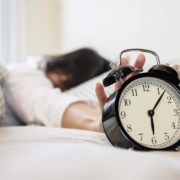If you don’t get proper sleep when you are young, you’ll be suffering from Alzheimer’s when you are old?
Why do human beings need sleep?
When we’re done with our busy day, our tired body thirsts for rest and sleep. Even though research has pointed out that the brain continues to stay active during sleep, and some people around us have even said that they will still feel energetic everyday with less than 5 hours of sleep, but is that really the case? What functions does sleep have on the human body?
Over the years, there were many theories on the functions of sleep, including wound healing, heat regulation, consolidation of memory, and dreams promoting a creative mind. However, a recent research published by a top scientific journal suggested that sleep might be associated with the prevention of Alzheimer’s disease.
This theory was first brought up by in 2005 by psychologists in St. James Hospital in Dublin. They demonstrated the correlation between sleeping disorders (insomnia, daytime napping) and the degree of dementia in patients suffering from Alzheimer’s disease. This is not strange at all, as many brain diseases are associated with sleep disorders. Therefore, this is considered a very practical knowledge, which assists doctors and caretakers in the selection of appropriate medication for improving sleep quality. However, a lot of people believe that such correlation goes even deeper, with a more complicated mechanism behind it.
In order to understand the connection between sleep and Alzheimer’s disease, some scientists began attempting to replicate the typical example of Alzheimer’s disease in mice. One of the teams, led by David Holtzman of Washington University in St. Louis, demonstrated the correlation between sleep and beta-amyloid concentration, as they discovered that beta-amyloid concentration in mice increased when they stripped away the sleep time of mice. Contrarily, by stimulating sleep through an injection of anesthetic, beta-amyloid concentration would decrease. These researches began in 2009. Afterwards, they further treated the mice with anti-beta-amyloid injections, and the mice went back to normal sleeping patterns as a result. A year later, Maiken Nedergaard of University of Rochester in New York and her team discovered that the brain would flush out metabolic wastes by itself during deep sleep. Specifically, the brain would utilize a network of micro-channels filled with the cerebrospinal fluid to remove the metabolic waste such as beta-amyloid in the brain. This network of channels is called the “glymphatic pathway,” a lymphatic system that is made up of neuroglial cells that is capable of brain waste removal. This discovery is recognized as associated with Alzheimer’s disease.
Next, neuroscientist Matthew Walker of University of California, Berkeley and his team conducted further research. He believes that the connection between sleep and memory is more intimate than what people currently knows. His research discovered that the brain would conduct memory consolidation during NREM sleep, especially during the stage of slow-wave sleep. His research also indicated that those with higher levels of beta-amyloid concentration do not perform well in slow-wave sleep, and the same goes with memory recall. This research emphasized the potential importance of sleep in the treatment of Alzheimer’s disease. However, there are also a few issues that lie with this research, such as the fact that its causality has yet to be determined, or the fact that participants underwent testing in different environments could also affect the explanation of the results.
Even though there are still problems yet to be solved, these researches provided new insights and research directions concerning the relationship between sleep, beta-amyloid, and memory, as well as indicated that there may be complex interactions between the three. The results of these researches provided new possibilities for the treatment and prevention of Alzheimer’s disease.
Although there are still plenty of contradicting perspectives regarding Alzheimer’s disease, there are still evidences, albeit insufficient, which confirm that adopting a non-pharmacological method in treating Alzheimer’s disease still exist. In any case, it is still essential for us to adopt some proper lifestyle choices cautiously to prevent Alzheimer’s disease.




